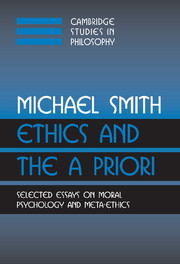Book contents
- Frontmatter
- Contents
- Preface
- Sources
- Introduction
- Part One Moral Psychology
- Part Two Meta-Ethics
- 10 Moral Realism
- 11 Does the Evaluative Supervene on the Natural?
- 12 Objectivity and Moral Realism: On the Significance of the Phenomenology of Moral Experience
- 13 In Defence of The Moral Problem: A Reply to Brink, Copp, and Sayre-McCord
- 14 Exploring the Implications of the Dispositional Theory of Value
- 15 Internalism's Wheel
- 16 Evaluation, Uncertainty, and Motivation
- 17 Ethics and the A Priori: A Modern Parable
- Index
- References
14 - Exploring the Implications of the Dispositional Theory of Value
Published online by Cambridge University Press: 04 December 2009
- Frontmatter
- Contents
- Preface
- Sources
- Introduction
- Part One Moral Psychology
- Part Two Meta-Ethics
- 10 Moral Realism
- 11 Does the Evaluative Supervene on the Natural?
- 12 Objectivity and Moral Realism: On the Significance of the Phenomenology of Moral Experience
- 13 In Defence of The Moral Problem: A Reply to Brink, Copp, and Sayre-McCord
- 14 Exploring the Implications of the Dispositional Theory of Value
- 15 Internalism's Wheel
- 16 Evaluation, Uncertainty, and Motivation
- 17 Ethics and the A Priori: A Modern Parable
- Index
- References
Summary
Suppose, just for the sake of argument, that the version of the dispositional theory of value that I myself prefer is correct (see, for example, Smith 1989, 1994a, 1997; compare Lewis 1989, Johnston 1989): when a subject judges it desirable for p to be the case in certain circumstances C, this is a matter of her believing that she would want p to be the case in C if she were in a state that eludes all forms of criticism from the point of view of reason – or, for short, and perhaps somewhat misleadingly (Copp 1997), if she were fully rational. More precisely, if still somewhat misleadingly, let's suppose that when a subject judges it desirable that p in C this is a matter of her believing that, in those nearby possible worlds in which she is fully rational – let's call these the “evaluating possible worlds” – she wants that, in those possible worlds in which C obtains – let's call these the “evaluated possible worlds” – p obtains.
Once we have supposed this to be so it is, I think, extremely tempting to suppose that we have thereby either explicitly or implicitly taken a stand on certain crucial debates in meta-ethics: tempting to suppose that we must be cognitivists as opposed to non-cognitivists; relativists as opposed to non-relativists; and realists as opposed to irrealists. We must be cognitivists because we have supposed that evaluative judgement is a species of belief.
- Type
- Chapter
- Information
- Ethics and the A PrioriSelected Essays on Moral Psychology and Meta-Ethics, pp. 297 - 317Publisher: Cambridge University PressPrint publication year: 2004



